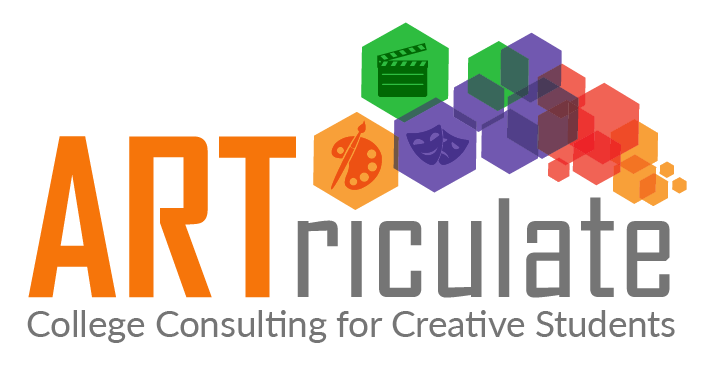Developing your college list. Balance is everything.
“There is no way we would have found the interdisciplinary programs we ended up applying to without ARTriculate’s help.”
While many students don't start researching prospective colleges until 11th grade, we recommend that families start visiting and researching colleges possibly as early as 9th grade and certainly by 10th grade. We encourage this because the earlier you start the more time you’ll have to fully consider your options. 11th grade is amazingly busy and your focus should really be on academics, testing, portfolio development or audition preparation. There just isn’t really enough time to visit all the colleges you might feel you want to in 11th grade.
After we’ve met to review and discussed your academic goals, passions and artistic accomplishments, it’s time to start talking about the characteristics to consider for college. These characteristics fall into three broad categories: academics, social, and environment. There are no right or wrong answers, you are unique and your needs are unique, what is the best fit college for your best friend may (or may not) be a good fit for you. We’ll think through it together and regardless of your answers we’ll suggest colleges for you to research and visit that meet your criteria.
What is your academic history? We’ll review your transcripts and test scores as these factor into both acceptances and merit-based financial aid.
What social activities do you want? College needs to fulfill your personal needs as well so we’ll discuss advocacy and community opportunities, sports teams, performance and exhibit opportunities, and do you want Saturday nights filled with greek activities or small gatherings with friends.
Where do you want to be? Big city, suburban campus, or large sprawling rural campus? North, south, east, west or heartland? Do you envision big city life replete with metro rides or hiking with a view of the stars? There are over 3,000 colleges in the U.S. so there’s probably one in any place you’d like to live.
What can you afford? This is a critical conversation, and every family has their own financial considerations that must be considered, we’ll offer talking points to facilitate family conversations
Where does this take you? Careers in the arts have vastly increased from the opportunities of the past, we’ll discuss potential careers in your field of interest and focus on how they translate into earning a sustainable income.
BFA/BMA, BS, or BA? There are big differences between degrees, we discuss what they are, what your options are and what might make the most sense for you.
Do you want internships or co-ops? Some schools have integrated co-op or internship programs built into their curriculums. A required internship or co-op might extend your academic schedule to five years.
What are the characteristics you want in a college? College is more than academics, we’ll consider curricula, size, student body, dorm life, social atmosphere, extracurriculars, location, financial aid and scholarships, and opportunities for professional development.
What type of school? There are a variety of different types of schools that offer programs in the arts with each providing a different experience: College of art and design, conservatory, smaller traditional liberal arts college, or larger university. Many students apply to a variety of programs and decide upon acceptance which suits them best.
We work with you to build a balanced and personalized college list. Developing this list may include suggestions for summer coursework, colleges to visit, professors to meet with, and other activities to acquaint you with interesting schools and/or augment your creative resume. Together we finalize your college list and update your customized timeline, to reflect the deadlines associated with your college choices.
If you decide to continue working with ARTriculate, we use your college list and your customized timeline to work with you on the next step - Preparing and Submitting Your Applications.
